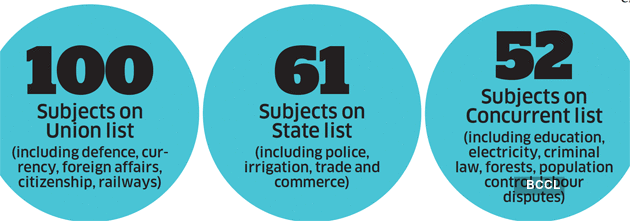[ad_1]
As many as 12 states and two Union territories are now ruled by parties that do not agree with the BJP on several issues. This, coupled with the saffron party’s uncompromising thrust to realise political goals, has opened new windows of confrontation. There is also a subtle attempt, mainly by select states, to legally rebalance the equilibrium between the Union and states.
While many of the earlier fault lines have remained in Centre-state ties, a new addition that threatens to disrupt the balance further is the enactment of a new citizenship law, and its political fallouts.
The Citizenship (Amendment) Act-2019, which allows six non-Muslim communities from three nations to secure Indian citizenship, is being fiercely opposed by several political parties and civil society groups. The state governments of Kerala, West Bengal, Punjab and Rajasthan have even said they won’t allow the new law to be implemented in their respective states.

Kerala has even gone a couple of steps ahead. First, its assembly adopted a resolution asking the Centre to repeal the new law and then, the state moved the Supreme Court invoking Article 131 of the Constitution, which gives the apex court the power to decide in a dispute between the Centre and a state.
Congress-ruled Punjab has repeatedly announced that it won’t allow the new citizenship law and its potential follow-ons — the National Population Register and the National Register of Citizens — to be implemented in the state though it had not moved court. Both Punjab and Rajasthan assemblies have passed resolutions against the CAA.
Significantly, citizenship is one of the 100 subjects included in the Union list on which the Centre can override a state’s view.
Meanwhile, Congressruled Chhattisgarh has also filed a case under Article 131 to challenge the National Investigating Agency Act, arguing that the 2008 law passed by the Parliament encroaches upon the state’s power to handle law and order. The law gives power to the Centre to act in, say, the Naxal hotspot of Bastar without permission from the state.
The law was enacted when the Congress-led United Progressive Alliance (UPA) was in power at the Centre to deal with terror-related issues. No state has challenged its rationale and existence.
To be sure, Centre-state ties have soured in the past also — often over disputes relating to fund allocation, policing or at the central government’s bid to command states politically. One constitutional provision that sours this relationship more is Article 356, through which the Centre can imposes President’s Rule in a state. The political party in power at the Centre can use this Article to gain political dividends.
All states, barring Chhattisgarh and Telangana, have experienced this provision.
Uttar Pradesh and Manipur experienced it for nine and 10 times, respectively.
There have also been tussles due to mineral-rich states demanding a hike in royalty and because of Himalayan states asking for green bonuses for their forests and hydropower used by people in the plains.
NC Saxena, who served as secretary to the erstwhile Planning Commission, says: “The Centre started to flex its muscle in the 1980s when it began transferring funds meant for specific schemes to states through centrally-sponsored schemes.
The states were okay with this so long as the Centre’s intention appeared to be bonafide.” Now, states can afford to junk a Centre’s scheme thanks to the 14th Finance Commission’s largesse, which increased the state’s share of divisive pool of taxes from 32-42%, he adds.
Recently, Trinamool Congressruled West Bengal has been at the forefront in stonewalling central schemes. The eastern state refused to partner with NITI Aayog’s flagship Aspirational Districts, an ambitious rankingbased programme focusing on 115 backward districts across India.
Similarly, when Pradhan Mantri Jan Arogya Yojana was rolled out in September 2018 to provide an insurance coverage of Rs 5 lakh per family annually, states such of Delhi, Kerala, Odisha, Punjab and Telangana said no. West Bengal initially came on board but later pulled out of the scheme, with Chief Minister Mamata Banerjee alleging the Centre of politicising it.
Former Union minister and Trinamool Congress leader Dinesh Trivedi argues that a state is not legally bound to accept a central scheme. “In a democracy, differences of opinion are not defiance.
In the world’s oldest democracy — the US — a state can say no to an act passed by the federal government. We should take a leaf out of it,” he says, adding that the need of the hour is to repeatedly sing India’s national anthem, Jana Gana Mana, which names its states — and thus epitomises the true spirit of the country.
[ad_2]
Source link


